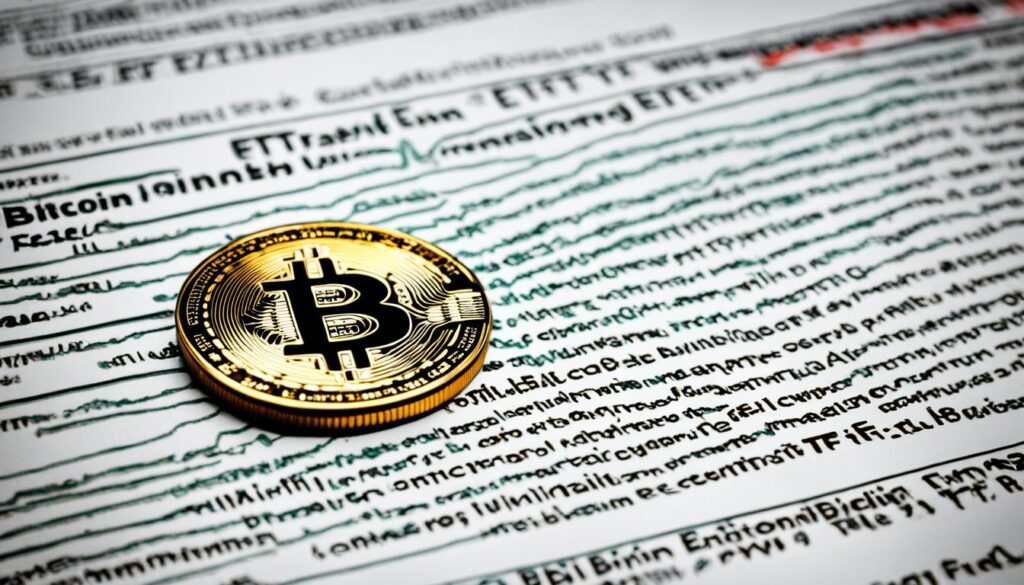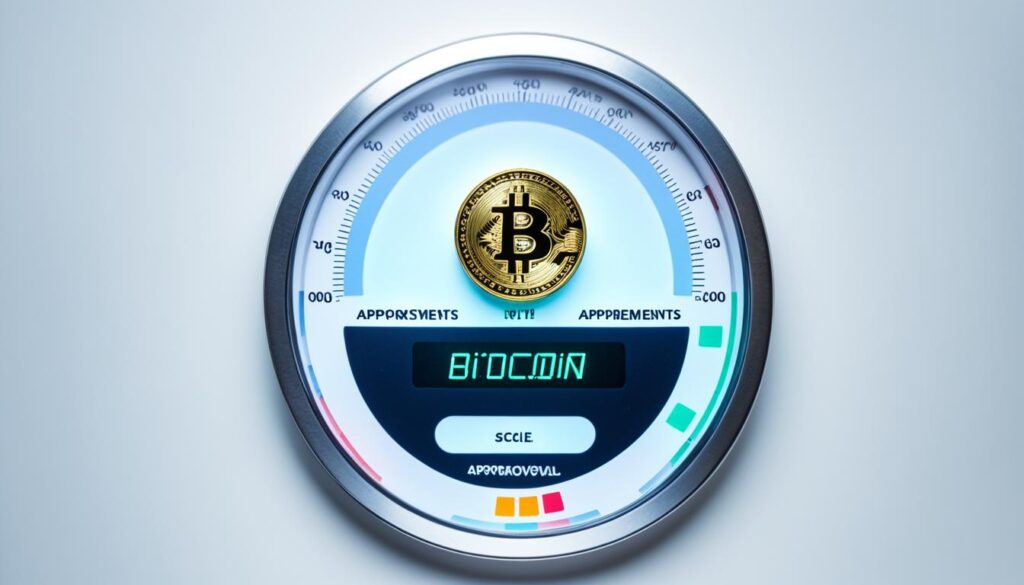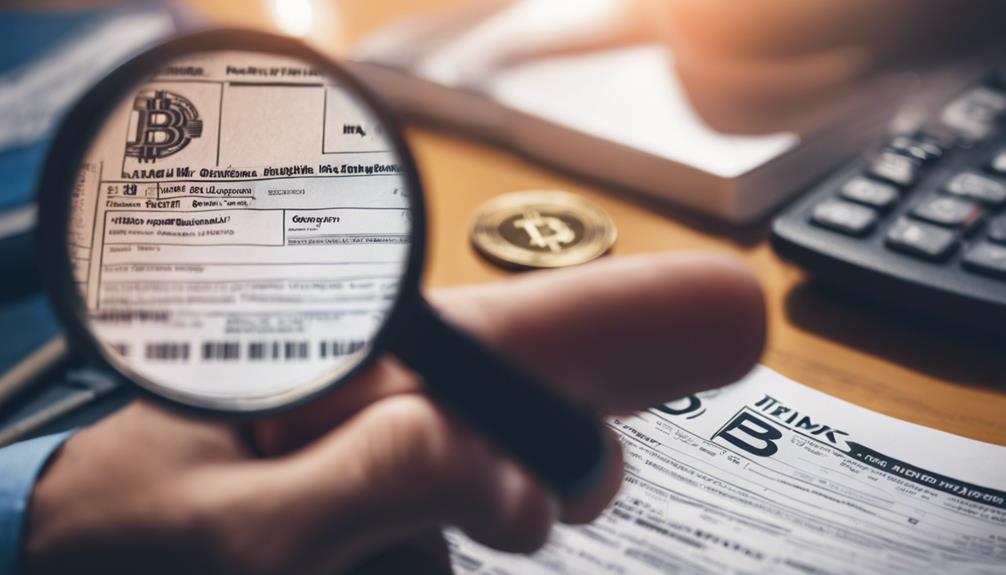Are you curious about getting involved in Bitcoin investing but feel overwhelmed by the complexities of holding and trading the cryptocurrency directly? Look no further! The recent approval of spot Bitcoin ETFs by the Securities and Exchange Commission (SEC) has created new opportunities for investors. Now, you can get exposure to Bitcoin through exchange-traded funds (ETFs), making cryptocurrency investment more convenient and secure. But how exactly do these ETFs operate, and what implications do they have for the future of digital asset management? Let’s demystify these concepts and guide you towards making smarter Bitcoin investments.
Key Takeaways
- Spot Bitcoin ETFs directly track the price of Bitcoin by holding the cryptocurrency itself, making it easier for investors to gain exposure to Bitcoin.
- The approval of spot Bitcoin ETFs is expected to have a positive impact on the price of Bitcoin, driving increased demand and potentially leading to higher returns.
- Spot Bitcoin ETFs are not the only option available; Bitcoin strategy ETFs, which track the price of Bitcoin indirectly, were already on the market prior to the SEC approvals.
- The competition among ETF issuers has sparked a price war, resulting in reduced fees for both spot Bitcoin ETFs and Bitcoin strategy ETFs.
- Investors should be aware of potential custodianship risks when selecting spot Bitcoin ETFs, as most rely on third-party custodians such as Coinbase, Fidelity, and Gemini.
What is a spot Bitcoin ETF?
A spot Bitcoin ETF is an exchange-traded fund (ETF) that directly tracks the price of Bitcoin by holding a large amount of the cryptocurrency itself. It operates similarly to a spot gold ETF, which holds physical gold bullion on behalf of its shareholders. These ETFs allow investors to gain exposure to Bitcoin without having to buy and store the cryptocurrency themselves.
How do spot Bitcoin ETFs work?
Spot Bitcoin ETFs function by holding a significant quantity of Bitcoin. Each share of the ETF represents a fractional ownership interest in the underlying Bitcoin holdings. As the price of Bitcoin fluctuates, the value of the ETF shares also changes. This direct correlation allows investors to profit from the movements in the Bitcoin price without directly owning the cryptocurrency.
Similar to other ETFs, spot Bitcoin ETFs are traded on major exchanges, allowing investors to buy and sell shares throughout the trading day. This provides liquidity and ease of trading for investors, unlike purchasing Bitcoin directly, which requires setting up a digital wallet and navigating cryptocurrency exchanges.
Spot Bitcoin ETFs also offer the advantage of diversification. Instead of solely relying on the performance of Bitcoin, investors can access a basket of other assets within the ETF. This diversification can help reduce risk and potentially enhance returns.
Furthermore, spot Bitcoin ETFs typically have lower barriers to entry compared to investing in Bitcoin directly. Investors can buy shares of the ETF with as little as the price of one share, making cryptocurrency investment more accessible.
“Spot Bitcoin ETFs provide a seamless avenue for investors to gain exposure to Bitcoin without the complexity and security concerns associated with purchasing and storing the cryptocurrency themselves.” – Cryptocurrency Expert
Spot Bitcoin ETFs vs. Exchange-Traded Funds for Traditional Assets
While spot Bitcoin ETFs share similarities with traditional ETFs that track stocks, bonds, or commodities, there are key differences. Traditional ETFs invest in assets that already exist, such as company stocks or physical gold, while spot Bitcoin ETFs hold the underlying asset directly.
Spot Bitcoin ETFs also have the advantage of being traded on regulated securities exchanges, where they are subject to the same investor protection regulations as other ETFs. This provides an additional layer of oversight and transparency for investors.
The rise of spot Bitcoin ETFs signifies a growing acceptance of cryptocurrency as a legitimate investment asset class. As more investors seek exposure to digital currencies, spot Bitcoin ETFs offer a regulated and convenient avenue for participation in the cryptocurrency market.
The Benefits of Spot Gold ETFs and Their Parallels to Spot Bitcoin ETFs
The concept of holding physical assets through an ETF is not unique to Bitcoin. Spot gold ETFs, for example, allow investors to gain exposure to the price of gold without directly owning or storing the physical metal. These ETFs hold physical gold bullion, similar to how spot Bitcoin ETFs hold Bitcoin.
Like spot Bitcoin ETFs, spot gold ETFs offer a convenient and cost-effective way for investors to gain exposure to gold. They eliminate the need for purchasing and storing physical gold, which can be cumbersome and may incur additional costs, such as insurance and security measures.
The comparison between spot Bitcoin ETFs and spot gold ETFs highlights the potential for spot Bitcoin ETFs to attract investors looking to diversify their portfolios with digital assets. As the popularity of cryptocurrencies continues to grow, spot Bitcoin ETFs provide a bridge between traditional investing and the evolving landscape of digital currencies.

| Spot Bitcoin ETF | Spot Gold ETF |
|---|---|
| Tracks the price of Bitcoin | Tracks the price of gold |
| Holds a large amount of Bitcoin | Holds physical gold bullion |
| Traded on securities exchanges | Traded on securities exchanges |
| Offers exposure to digital assets | Offers exposure to gold |
| Allows diversification in cryptocurrency | Allows diversification in precious metals |
Top 11 spot Bitcoin ETFs by fee
Here is a comprehensive list of the approved spot Bitcoin ETFs and their respective fees, ranked from the lowest to the highest fee:
| ETF Name | Ticker | Annual Fee (Expense Ratio) | Fee Waiver Details |
|---|---|---|---|
| Grayscale Bitcoin Trust | GBTC | 1.5% | N/A |
| Invesco Galaxy Bitcoin ETF | BTCO | 0.39% | Waived in first 6 months for the first $5 billion AUM |
| Hashdex Bitcoin ETF | DEFI | 0.9% | N/A |
| Franklin Bitcoin ETF | EZBC | 0.29% | N/A |
| Wisdom Tree Bitcoin Fund | BTCW | 0.3% | Waived in first 6 months for the first $1 billion AUM |
| Valkyrie Bitcoin Fund | BRRR | 0.25% | Waived in first 3 months |
| VanEck Bitcoin Trust | HODL | 0.25% | N/A |
| Fidelity Wise Origin Bitcoin Trust | FBTC | 0.25% | Waived until August 1, 2024 |
| iShares Bitcoin Trust | IBIT | 0.25% | 0.12% for first 12 months or until $5 billion AUM |
| ARK 21Shares Bitcoin ETF | ARKB | 0.21% | Waived for first 6 months or until $1 billion AUM |
| Bitwise Bitcoin ETF | BITB | 0.2% | Waived in first 6 months for the first $1 billion AUM |
This table includes details about the fee waivers that some of these ETFs offer as introductory incentives to attract initial investments
These spot Bitcoin ETFs offer various fee structures, allowing investors to choose an ETF that aligns with their investment goals and preferences.

But wait — weren’t there already Bitcoin ETFs on the market?
While spot Bitcoin ETFs may be getting all the attention now, it’s important to note that Bitcoin strategy ETFs have been around for some time. These ETFs offer a different approach to gaining exposure to Bitcoin, tracking its price indirectly through investments in Bitcoin futures or Bitcoin mining stocks. While spot Bitcoin ETFs hold the cryptocurrency itself, Bitcoin strategy ETFs provide investors with an alternative way to participate in the potential growth of the Bitcoin market.
Bitcoin futures, which are contracts that allow investors to speculate on the future price of Bitcoin, have been a popular choice for Bitcoin strategy ETFs. By investing in Bitcoin futures contracts, these ETFs aim to capture the price movements of Bitcoin without directly holding the cryptocurrency. This strategy allows investors to potentially benefit from Bitcoin’s volatility while avoiding the need for custodial storage of the digital asset.
Bitcoin mining stocks are another avenue for gaining exposure to Bitcoin through ETFs. These ETFs invest in companies that are involved in the mining of Bitcoin, allowing investors to indirectly participate in the process of creating new Bitcoins. By investing in Bitcoin mining stocks, investors can potentially benefit from the increasing demand for Bitcoin as the cryptocurrency becomes more widely adopted.
It’s worth noting that while Bitcoin strategy ETFs offer investors a way to gain exposure to Bitcoin, the returns of these ETFs may not directly mirror the performance of Bitcoin itself. Factors such as market dynamics and the specific investments made by the ETF can lead to deviations in returns. Therefore, it’s important for investors to carefully consider their investment objectives and conduct thorough research before investing in Bitcoin strategy ETFs.
Bitcoin strategy ETFs provide investors with different options for participating in the Bitcoin market. Whether through Bitcoin futures or Bitcoin mining stocks, these ETFs offer a unique way to gain exposure to the potential growth and volatility of Bitcoin. However, investors should always be aware of the risks associated with investing in ETFs and conduct thorough due diligence before making any investment decisions.

The Benefits of Bitcoin Strategy ETFs
Investing in Bitcoin strategy ETFs offers several potential benefits:
- Diversification: By investing in Bitcoin strategy ETFs, investors can diversify their portfolios and potentially reduce risk by gaining exposure to different sectors of the Bitcoin market.
- Accessibility: Bitcoin strategy ETFs provide a convenient and accessible way for investors to participate in the Bitcoin market without the need for technical expertise or the hassle of managing digital wallets.
- Liquidity: ETFs are traded on major exchanges, providing investors with the ability to buy and sell shares easily. This liquidity can be particularly beneficial for investors who want to take advantage of short-term price movements.
- Regulated and Transparent: Bitcoin strategy ETFs are regulated investment products that must comply with industry standards and disclosure requirements. This provides investors with transparency and a level of oversight that may not be present in other investment options.
Comparing Bitcoin Strategy ETFs
To compare the Bitcoin Strategy ETFs based on performance, expense ratio, and risk, we have compiled the relevant data from the search results into a table. This table includes the ETF name, ticker, performance metrics, expense ratio, and key risk factors associated with each ETF.
| ETF Name | Ticker | 1-Year Return | Expense Ratio | Key Risks |
|---|---|---|---|---|
| ProShares Bitcoin Strategy ETF | BITO | 101.93% | 0.95% | Futures roll costs, market volatility[14] |
| Valkyrie Bitcoin and Ether Strategy ETF | BTF | Not specified | 1.24% | Market volatility, regulatory changes[3] |
| Global X Blockchain and Bitcoin Strategy ETF | BITS | Not specified | 0.65% | Market volatility, blending risks[3] |
| ARK 21Shares Bitcoin ETF | ARKB | 37.77% | 0.21% | Market volatility, fee changes post-waiver[11] |
| Bitwise Bitcoin ETF | BITB | 37.47% | 0.20% | Market volatility, tracking error[4][11] |
| VanEck Bitcoin Trust | HODL | 37.51% | 0.25% | Market volatility, regulatory risks[11] |
| WisdomTree Bitcoin Fund | BTCW | 38.61% | 0.30% | Market volatility, liquidity issues[11] |
| Valkyrie Bitcoin Fund | BRRR | 37.40% | 0.25% | Market volatility, fee changes post-waiver[11] |
| Franklin Bitcoin ETF | EZBC | 38.00% | 0.29% | Market volatility, tracking accuracy[11] |
| iShares Bitcoin Trust | IBIT | 37.70% | 0.25% | Market volatility, tracking error[11] |
| Invesco Galaxy Bitcoin ETF | BTCO | 38.32% | 0.39% | Market volatility, initial fee waiver[11] |
Key Points:
- Performance: The 1-year return varies significantly among the ETFs, with ProShares Bitcoin Strategy ETF (BITO) showing a notably high return of 101.93%. Other ETFs have returns in the range of approximately 37% to 38%.
- Expense Ratio: Expense ratios range from 0.20% to 1.24%. Bitwise Bitcoin ETF (BITB) has the lowest expense ratio at 0.20%, while Valkyrie Bitcoin and Ether Strategy ETF (BTF) has the highest at 1.24%.
- Risk Factors: Common risks across all ETFs include market volatility and regulatory changes. Specific risks such as futures roll costs are noted for BITO, and tracking errors are a concern for ETFs like BITB and IBIT.
This table provides a comprehensive overview of the key aspects of each Bitcoin Strategy ETF, helping investors make informed decisions based on performance, costs, and potential risks[3][4][11][14].
Citations:
[1] https://www.ulam.io/blog/understanding-bitcoin-etfs-risks-and-opportunities
[2] https://darec.duke.edu/sites/darec.duke.edu/files/images/Bitcoin_ETFs.pdf
[3] https://www.usatoday.com/money/blueprint/investing/cryptocurrency/best-bitcoin-etfs/
[4] https://www.cnbc.com/2024/01/11/what-will-it-cost-you-to-buy-a-bitcoin-etf-here-are-the-cheapest-and-most-expensive-funds.html
[5] https://www.retirebeforedad.com/bitcoin-etf-fees/
[6] https://www.investopedia.com/news/what-difference-between-blockchain-etfs-and-bitcoin-etfs/
[7] https://www.nytimes.com/2024/01/19/business/bitcoin-etf-investing.html
[8] https://www.morningstar.com/etfs/spot-bitcoin-etfs-are-here-should-you-invest
[9] https://www.nerdwallet.com/article/investing/spot-bitcoin-etf
[10] https://www.investopedia.com/pros-and-cons-of-crypto-etfs-8362499
[11] https://www.tipranks.com/compare-etfs/bitcoin-etfs
[12] https://money.usnews.com/investing/articles/new-spot-bitcoin-etfs-to-buy
[13] https://etfdb.com/themes/bitcoin-etfs/
[14] https://consent.yahoo.com/v2/collectConsent
[15] https://www.etf.com/sections/etf-basics/how-choose-best-spot-bitcoin-etf
[16] https://www.forbes.com/advisor/investing/cryptocurrency/best-bitcoin-etfs/
When comparing Bitcoin strategy ETFs, it’s important to consider the investment strategy, expense ratio, and historical performance of each ETF. Investors should also take into account their own investment goals, risk tolerance, and time horizon when selecting the most suitable Bitcoin strategy ETF for their investment needs.
Top 8 Bitcoin strategy ETFs by fee
Investors looking to gain exposure to Bitcoin through exchange-traded funds (ETFs) have a range of options to choose from. Here are the top Bitcoin strategy ETFs ranked by their fees, from lowest to highest:
| ETF Name | Ticker | Expense Ratio | Fee Waiver Details |
|---|---|---|---|
| Bitwise Bitcoin ETF | BITB | 0.20% | 0% fees for first 6 months or $1 billion[5][7] |
| ARK 21Shares Bitcoin ETF | ARKB | 0.21% | 0% fees for first 6 months or $1 billion[2][3] |
| iShares Bitcoin Trust | IBIT | 0.25% | 0.12% for first 12 months or until $5 billion AUM[3][5] |
| Fidelity Wise Origin Bitcoin Trust | FBTC | 0.25% | 0% fees until July 31, 2024[3][5] |
| VanEck Bitcoin Trust | HODL | 0.25% | N/A[3] |
| Valkyrie Bitcoin Fund | BRRR | 0.25% | 0% fees for first 3 months[3][5] |
| WisdomTree Bitcoin Fund | BTCW | 0.30% | 0% fees for first 3 months[3][5] |
| Invesco Galaxy Bitcoin ETF | BTCO | 0.39% | 0% fees for first 6 months[2][3] |
Key Points:
- Expense Ratio: The expense ratios range from 0.20% to 0.39%. Bitwise Bitcoin ETF (BITB) has the lowest listed expense ratio at 0.20%.
- Fee Waivers: Several ETFs offer temporary fee waivers to attract initial investments. For example, ARK 21Shares Bitcoin ETF (ARKB) and Bitwise Bitcoin ETF (BITB) both offer a 0% fee for the first 6 months or until they reach $1 billion in assets under management (AUM).
- iShares Bitcoin Trust (IBIT): This ETF offers a reduced fee of 0.12% for the first 12 months or until it reaches $5 billion in AUM, after which the fee will be 0.25%.
- Fidelity Wise Origin Bitcoin Trust (FBTC): Currently waiving its fee entirely until July 31, 2024, after which the fee will be 0.25%.
- Valkyrie Bitcoin Fund (BRRR): Offers a 0% fee for the first 3 months.
- WisdomTree Bitcoin Fund (BTCW): Also offers a 0% fee for the first 3 months.
- Invesco Galaxy Bitcoin ETF (BTCO): Offers a 0% fee for the first 6 months.
This table provides a snapshot of the fee structures for the top 8 Bitcoin strategy ETFs as of the latest available data[2][3][5][7].
Citations:
[1] https://finance.yahoo.com/news/10-best-blockchain-bitcoin-etfs-214621265.html
[2] https://www.thestreet.com/etffocus/trade-ideas/bitcoin-etfs-are-here-full-list-their-outlooks-and-winners-losers
[3] https://investorplace.com/2024/01/looking-for-the-best-bitcoin-etf-hint-its-not-an-etf/
[4] https://www.nerdwallet.com/article/investing/spot-bitcoin-etf
[5] https://www.swanbitcoin.com/bitcoin-etf-fees/
[6] https://money.com/best-bitcoin-etfs/
[7] https://money.usnews.com/investing/articles/best-cryptocurrency-etfs-to-buy
[8] https://www.thestreet.com/etffocus/trade-ideas/best-bitcoin-crypto-ethereum-etfs
[9] https://www.tipranks.com/compare-etfs/bitcoin-etfs
[10] https://money.usnews.com/investing/articles/new-spot-bitcoin-etfs-to-buy
[11] https://www.wsj.com/buyside/personal-finance/best-bitcoin-etfs-9ef2cf6a
[12] https://www.nasdaq.com/articles/bitcoin-etfs-are-here.-which-one-should-you-buy-if-any-of-them
It’s important to note that fees can vary among different Bitcoin strategy ETFs and can impact your investment returns. Therefore, it’s essential to carefully consider the expense ratio when selecting an ETF to ensure it aligns with your investment goals and risk tolerance.
Choosing the right Bitcoin strategy ETF can be a crucial decision for investors seeking exposure to cryptocurrencies. By evaluating the fees and other factors, investors can make informed decisions that suit their investment objectives.
The Bitcoin ETF price war
The approval of spot Bitcoin ETFs has ignited a fierce price war among issuers, resulting in reduced fees and promotional fee waivers for both spot Bitcoin ETFs and Bitcoin strategy ETFs. Issuers are aggressively cutting their fees in an effort to gain a larger market share and attract more investors. This intense competition is highly beneficial for traders and investors, as it allows them to capitalize on the lower costs associated with trading Bitcoin ETFs.
With the introduction of spot Bitcoin ETFs, investors now have a wider range of options to choose from when looking to invest in cryptocurrencies. These ETFs track the price of Bitcoin directly, providing a simple and convenient way to gain exposure to the digital asset without the complexities of owning and storing actual Bitcoins.
This price war is having a significant impact on the overall cryptocurrency market. As issuers continue to offer lower fees and attractive promotional fee waivers, it is becoming increasingly affordable for investors to get involved in Bitcoin ETFs, ultimately driving greater adoption and acceptance of cryptocurrencies.
Benefits of the Bitcoin ETF price war
“The Bitcoin ETF price war has created a win-win situation for both traders and investors. Traders can take advantage of the reduced costs associated with trading Bitcoin ETFs, maximizing their potential profits. At the same time, investors can diversify their portfolios and participate in the cryptocurrency market without bearing the burden of high fees.”
In addition to lower fees, the promotional fee waivers being offered by issuers further incentivize investors to consider Bitcoin ETFs as part of their investment strategy. These waivers can significantly reduce the overall costs associated with investing in Bitcoin ETFs, making them a more appealing option for both retail and institutional investors.
Furthermore, the price war among Bitcoin ETF issuers is driving innovation in the industry. As issuers compete to differentiate themselves and attract investors, they are constantly improving their offerings and launching new features and services. This competition ultimately benefits investors as they have access to a broader range of Bitcoin ETFs, each with their own unique features and investment strategies.
Top Bitcoin ETFs with Reduced Fees
As the table below shows, issuers are actively reducing their fees to gain a competitive edge. These fee reductions make investing in Bitcoin ETFs more cost-effective and can potentially increase their overall returns. Investors need to stay informed about the latest fee structures and promotional offerings to make well-informed investment decisions.
Based on the provided search results, here is a table summarizing the top Bitcoin ETFs that have recently reduced their fees:
| ETF Name | Ticker | Reduced Fee | Original Fee | Fee Reduction Details |
|---|---|---|---|---|
| Bitwise Bitcoin ETF | BITB | 0.20% | 0.24% | Reduced fee to attract more assets under management[1][3]. |
| ARK 21Shares Bitcoin ETF | ARKB | 0.21% | Higher initial proposal | Fees reduced after initial higher proposal to stay competitive[1]. |
| iShares Bitcoin Trust | IBIT | 0.25% | N/A | Offers a reduced fee of 0.12% for the first 12 months or until reaching $5 billion AUM[1]. |
| Fidelity Wise Origin Bitcoin Trust | FBTC | 0.25% | 0.75% | Fee reduced from 0.75% to 0.25%, with a temporary waiver to 0% until July 31, 2024[1][3][7]. |
| VanEck Bitcoin Trust | HODL | 0.25% | Higher initial proposal | Announced plans to lower fees and temporarily eliminate management fee until March 31, 2025[3]. |
| Valkyrie Bitcoin Fund | BRRR | 0.25% | 0.49% | Reduced from initial 0.49% to 0.25% just before launch, with a temporary fee waiver[1]. |
| Grayscale Bitcoin Trust | GBTC | 1.5% | 2% | Reduced from 2% to 1.5% as part of its conversion to an ETF[1]. |
| Grayscale’s Bitcoin Mini Trust | BTC | 0.15% | N/A | New spinoff with a significantly lower fee of 0.15%, aimed at regaining market share[6]. |
Key Points:
- Bitwise Bitcoin ETF (BITB) and ARK 21Shares Bitcoin ETF (ARKB) are among the ETFs that have significantly reduced their fees to stay competitive in the market.
- iShares Bitcoin Trust (IBIT) offers a promotional reduced fee for the first year or until a certain asset threshold is reached, which is a strategy to attract initial investments.
- Fidelity Wise Origin Bitcoin Trust (FBTC) and VanEck Bitcoin Trust (HODL) have implemented temporary fee waivers to attract investors, with FBTC also reducing its fee from a higher initial rate.
- Valkyrie Bitcoin Fund (BRRR) adjusted its fee downward just before launch, reflecting the competitive pressure in the ETF market.
- Grayscale Bitcoin Trust (GBTC) and its new spinoff, Grayscale’s Bitcoin Mini Trust (BTC), are strategies by Grayscale to adjust to market demands and retain their market position by offering lower fees[1][3][6][7].
Citations:
[1] https://www.cnbc.com/2024/01/11/what-will-it-cost-you-to-buy-a-bitcoin-etf-here-are-the-cheapest-and-most-expensive-funds.html
[2] https://milkroad.com/bitcoin/etf/
[3] https://www.swanbitcoin.com/bitcoin-etf-fees/
[4] https://www.nerdwallet.com/article/investing/spot-bitcoin-etf
[5] https://www.bankrate.com/investing/best-bitcoin-etfs/
[6] https://qz.com/grayscale-to-launch-mini-bitcoin-etf-1851425762
[7] https://money.usnews.com/investing/articles/new-spot-bitcoin-etfs-to-buy
[8] https://www.wsj.com/buyside/personal-finance/best-bitcoin-etfs-9ef2cf6a

Overall, the Bitcoin ETF price war is driving down costs and increasing accessibility for investors who are looking to venture into the world of cryptocurrencies. It is an exciting time for the industry as issuers compete to provide the best investment options and services for their clients. Investors are encouraged to closely monitor the evolving landscape of Bitcoin ETFs to capitalize on the benefits offered by this price war.
Do spot Bitcoin ETFs have custodianship risk?
Most spot Bitcoin ETFs rely on a third-party custodian to store the Bitcoin they hold. The majority of the currently-trading spot Bitcoin ETFs use Coinbase as their custodian, except for the Fidelity Wise Origin Bitcoin Fund and the VanEck Bitcoin Trust, which use Fidelity and Gemini as their custodians, respectively. The dominance of Coinbase as a custodian raises concerns about custodianship risk. If Coinbase were to face financial trouble or other issues, the holdings of Bitcoin ETFs could be at risk. While there are mechanisms in place for recovering the holdings in the event of a custodian’s bankruptcy, they are not instant or automatic. Investors should consider this potential risk when selecting a spot Bitcoin ETF.

| ETF Fund | Custodian |
|---|---|
| Coinbase Bitcoin Trust | Coinbase |
| Grayscale Bitcoin Trust | Coinbase |
| Fidelity Wise Origin Bitcoin Fund | Fidelity |
| VanEck Bitcoin Trust | Gemini |
What do the approvals mean for Bitcoin and other crypto investments?
The recent approvals of spot Bitcoin ETFs by the Securities and Exchange Commission (SEC) have significant implications for both Bitcoin and the broader cryptocurrency market. These approvals mark a milestone in the institutional adoption of Bitcoin and provide new avenues for investors to access and invest in the digital asset.
One of the key impacts of these approvals is the potential positive effect on the price of Bitcoin. With spot Bitcoin ETFs now available, investors who were previously unable to access Bitcoin, such as those with 401(k)s and IRAs, can now allocate funds to the cryptocurrency. This increased demand for Bitcoin is anticipated to drive its price higher in the coming years.
However, it’s important to note that the approval of these ETFs does not guarantee immediate or significant inflows on the first day of trading. Investors should manage their expectations and consider the long-term potential of Bitcoin investments. The market for cryptocurrency investments can be volatile, and investors should carefully evaluate their risk tolerance and investment goals before making any decisions.
It’s also worth noting that the approval of spot Bitcoin ETFs has broader implications for the cryptocurrency market as a whole. The introduction of regulated, exchange-traded funds provides credibility and legitimacy to the asset class, attracting more institutional investors and potentially leading to increased liquidity and stability.
The approval of spot Bitcoin ETFs provides an avenue for investors who were previously unable to access Bitcoin, such as those with 401(k)s and IRAs, to allocate funds to the cryptocurrency.
Furthermore, the approval of these ETFs is expected to pave the way for future developments in the cryptocurrency market. As more investors participate in the market through these regulated instruments, it is likely to spur innovation and advancements in digital asset management and blockchain-based financial products.
Investing in Bitcoin ETFs vs. Directly Owning Bitcoin
Bitcoin ETFs offer a convenient and secure way for investors to gain exposure to Bitcoin without the complexities of owning and trading the cryptocurrency directly. By investing in these ETFs, investors can benefit from the potential price appreciation of Bitcoin while avoiding the hurdles associated with custody, storage, and security.
Additionally, spot Bitcoin ETFs provide a level of regulatory oversight and investor protection that may not be present in the unregulated and decentralized nature of the cryptocurrency market. This regulatory framework can instill confidence in investors and attract those who may have been hesitant to enter the market due to concerns about security and fraud.
Bitcoin ETFs offer a convenient and secure way for investors to gain exposure to Bitcoin without the complexities of owning and trading the cryptocurrency directly.
| Investment Method | Pros | Cons |
|---|---|---|
| Spot Bitcoin ETFs |
|
|
| Direct Ownership of Bitcoin |
|
|
Ultimately, the choice between investing in spot Bitcoin ETFs or directly owning Bitcoin depends on an individual’s investment goals, risk tolerance, and comfort with the associated operational and security aspects.

Conclusion
The approval of spot Bitcoin ETFs has revolutionized the world of cryptocurrency investment by providing investors with new opportunities to access and invest in Bitcoin through ETFs. These Bitcoin ETFs offer a convenient and secure way to gain exposure to Bitcoin without the complexities of directly holding and trading the cryptocurrency.
Whether investors choose spot Bitcoin ETFs or Bitcoin strategy ETFs, they now have a wide range of investment options at their disposal. However, it is crucial for investors to carefully consider their investment goals, risk tolerance, and the associated fees before making their final investment decisions.
With the increasing acceptance and adoption of Bitcoin, ETFs have emerged as a viable avenue for diversification and potential long-term gains in the cryptocurrency market. By incorporating Bitcoin ETFs into their investment portfolios, investors can capitalize on the immense potential of cryptocurrencies while mitigating some of the inherent risks and uncertainties.
In summary, the introduction of spot Bitcoin ETFs and Bitcoin strategy ETFs marks a significant milestone in the evolution of cryptocurrency investments. These ETFs broaden access to Bitcoin and provide a structured approach to investing in this emerging asset class. As the market continues to mature, Bitcoin ETFs are likely to play an increasingly vital role for investors seeking exposure to the exciting world of cryptocurrencies.











